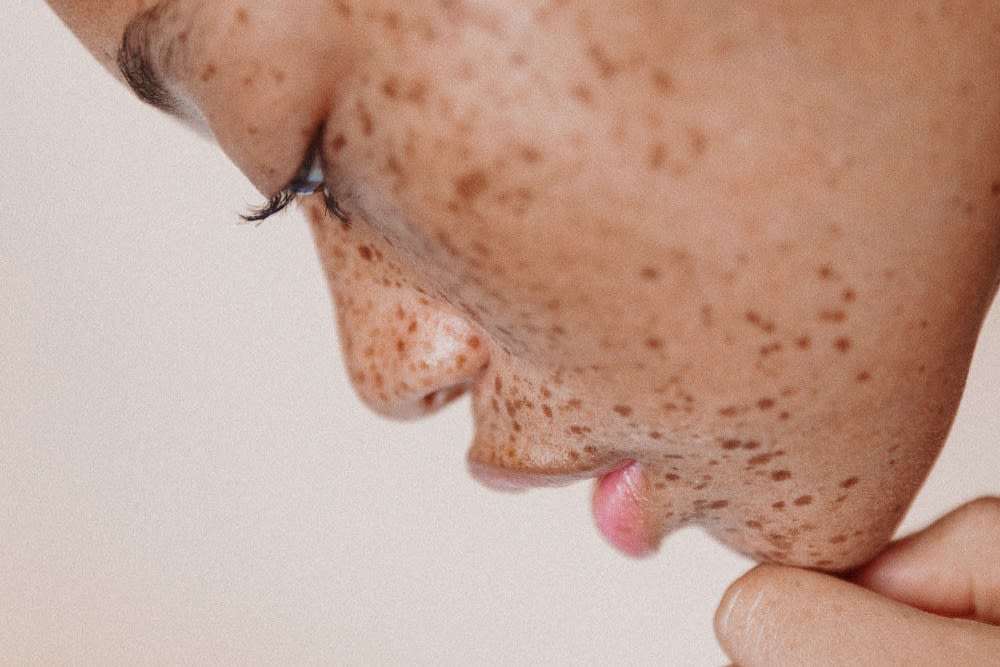Let’s try something really quickly: close your eyes, and try to picture your face. What do you see? First you might register colors, like the tone of your skin and the shimmer of your hair and the bright (or not) marbling of your irises. Then maybe you see your most distinctive features—the slope of your nose, the height of your cheeks, the shape of your hairline, the point of your chin. This is your memory self and you use it all the time, to do things like buy foundation or build a Bitmoji. What does yours look like? Mine always has freckles.
The earliest proof of my freckles comes as a school photo from 2006—I was nine, and had spent all nine of those years running around the sunshine state barefoot and barefaced. By the time I moved to New York almost a decade later, my childhood in Miami had given me more sun damage than your average college freshman. Perfectly aware. But several years later, as I sat in Union Square Laser Dermatology listening to Dr. Claire Chang explain the side effects of my impending Fraxel treatments, one of which is reversed sun damage, I sat up straighter in alarm.
It would erase my freckles? I wasn’t quite ready for that. I liked my freckles! They made my skin look youthful and fresh, and kind of camouflaged the look of breakouts, and also just seemed like part of my face. Acne scars? Those were new, and unwelcome. But my freckles were tied to the very idea of myself I had in my head, just as much as my blue-with-sunflowers eyes and bumpy nose were. Without them, I’d lose some history—my formative years erased from my face—and suddenly Fraxel felt as drastic as a nose job: I’d go in for my appointment, and leave looking fundamentally different. “Could we just skip the tops of my cheeks?,” I asked, and even though Dr. Chang said we totally could, I left the consultation with a knot in my stomach.
But a few days later I was ready to go all in. At the end of the day I did have sun damage, and appreciated the opportunity for a clean slate. Plus, my freckles would always come back—while my acne scars would be gone for good, I’d be back to my normal freckly self by June. As expected, at the end of the three sessions my freckles were lighter than they’d ever been. Gone, basically. But what I couldn’t have predicted was the way I didn’t miss them at all. I liked my skin without freckles—it was even, clean-looking, milky.
I liked it so much that, on a weekend trip to Mexico a month or so later, I found myself hiding out under two layers of SPF 50, a baseball cap, and a towel for most of the vacation. Every day, after I’d get back to my room, I’d wash my face and inspect the damage: had any new freckles popped up? Did I need to wear more sunscreen the next day? Preventing my freckles from “ruining” my Fraxel results consumed me, and I couldn’t even enjoy a day at the beach. Part of me knew it was inevitable that they'd come back, but I hoped they wouldn’t. I even scheduled a chemical peel for when I returned, desperate to keep my new complexion for just a little longer. It wasn’t until I got back that I realized my mania. What the heck was I doing?
"Interestingly enough," says clinical psychologist Dr. Nancy Gould, "obsessions with an aspect of body image often increase after a person experiences what they perceive to be a positive change in appearance—like weight loss, reduction of wrinkles, or even removal of freckles." I reached out to Dr. Gould to ask about these feelings, which she thought sounded like early stages of body dysmorphia. "People with this disorder may undergo cosmetic procedures to fix what bothers them, yet even when they achieve a positive result, the anxiety that the 'flaw' will return renders them vulnerable to frequent examination of their appearance in the mirror." Perhaps most importantly, dysmorphia widens the gap between how you think you look and how you actually do—when you can't picture yourself accurately, it sort of screws with your head.
By now I have some freckles again, and I’m still not quite sure how I feel about them. Sunscreen has become a daily necessity (which isn’t a bad thing, just, different for me). I want to love my freckles as much as I once did, and I’m sure I will over time. Still, the whole experience has made me wonder: how come, particularly when it comes to beauty, the grass always seems greener on the other side?
—Ali Oshinsky
Photo via ITG

